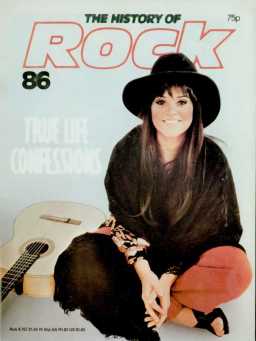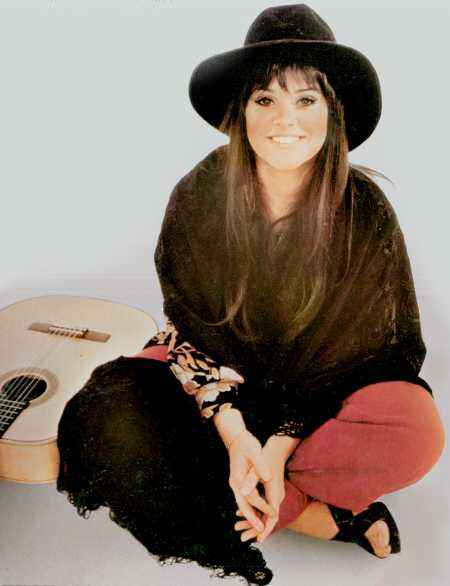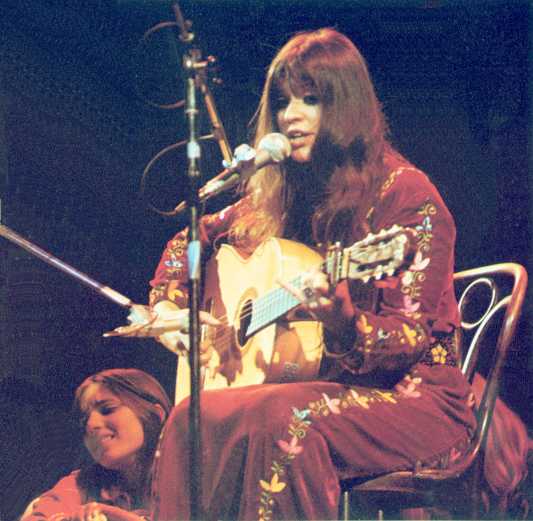The History of
Rock UK 1986
|
Melanie Lilting melodies |
|
||
|
MELANIE WAS,
IN MANY respects, the darling of the peace and love generation. Born Melanie
Safka on 3 February 1947 in Astoria (Queens), New York, her musical
inspiration came initially from her mother, a former jazz singer. Melanie has
since recalled: 'I started writing my own little songs, mostly imitations of
what I'd hear my mother singing around the house. It wasn't until I was 13 or
14 that I began to write about things I found in myself.' Her family moved to
Boston, Massachusetts, and then to Red Bank, New Jersey. At Red Bank High
School, Melanie's two main interests were music and drama. She taught herself
to play guitar, performing at school concerts, and appeared in many school
plays. |
|||
|
|
After leaving school, Melanie went back to
New York where she enrolled as a drama student at the American Academy of
Dramatic Arts in Manhattan and also took lessons in mime. She showed promise
as an actress, appearing as the Cheshire Cat in 'Alice In Wonderland' and as
Laura Wingate in Tennessee Williams' 'The Glass Menagerie'. At the same time,
Melanie was developing her musical career, singing in the coffeehouses of
Greenwich Village, her influences ranging from Pete Seeger to Bob Dylan. An
incident that determined the direction of Melanie's career occurred when she
went to audition for a play. She was mistakenly shown into the wrong office -
a music publisher's. As Melanie happened to have her guitar in tow, she was
asked to perform and made sufficient impression to set the wheels in motion
for a career in music. Early in 1967, Melanie secured her first
recording contract with Columbia Records and released a debut single for
them, 'Beautiful People", "God's Only Daughter', in the autumn of
that year. Although the single flopped, as did the remaining material she
recorded for that label throughout 1968, the A-side of the single proved one
of her most enduring tunes, later surfacing on her second album and proving
one of the popular mainstays of her live act. Melanie gradually built up a
following with constant club appearances in the New York area and a move to
Buddah Records in 1969 sealed her success. Later that year the single 'What
Have They Done To My Song, Ma?' proved a major hit in the US and was
subsequently covered by a number of other artists. A further boost was
provided by her appearance at the Woodstock Festival (1969) where she
followed Ravi Shankar on stage and received a rapturous ovation. |
||
|
Festival favourite During
her performance, as the rain came down, the audience lit candles in a display
of symbolic unity; this inspired Melanie to write 'Lay Down (Candles In The
Rain)'. The song (recorded with the Edwin Hawkins Singers) was a Top Ten US
hit as was the LP from which it was taken - Candles In The Rain (1970). A
further hit single in 1970, 'Peace Will Come (According To Plan)', confirmed
the singer's place at the head of the new generation of sweet-voiced
troubadours. Melanie was promptly invited to perform at the 1970 Isle of
Wight Festival, which finally brought her to the attention of a sizeable UK
audience. Melanie had her first hit in
the UK with her version of the Jagger-Richards composition 'Ruby Tuesday'
which reached Number 9 in the charts late in 1970. This was followed by a
minor hit with one of her best-known songs, 'What Have They Done To My Song,
Ma' early in 1971. After producing three further albums for Buddah - the live
Leftover Wine (1970), Good Book (1971) and a rather obscure soundtrack LP,
All The Right Noises (1971) - Melanie and her husband producer Peter
Schekeryk left Buddah to set up their own record label, Neighborhood Records,
in 1971. The venture achieved instant
success with Melanie's first single on the new label - 'Brand New Key' which
reached Number 1 in the US and Number 4 in Britain early in 1972. The debut
album on Neighborhood, Gather Me (1971) went gold. Buddah cashed in on
Melanie's success by releasing compilations and material Melanie had recorded
before leaving the label. These included Four Sides Of Melanie (1974) and
Garden In The City (1975), the latter a collection of unsatisfactory demos
packaged in a 'scratch and sniff' cover. A further bonus for Buddah was the
healthy US sales of the single 'Nickel Song'; the track became a Number 35
hit in 1972. This period represented the
pinnacle of Melanie's career. With her clear, ringing voice - reminiscent of
Edith Piaf- and songs of uncomplicated honesty (if occasionally twee and
naive), Melanie provided a sensitive and refreshing contrast to the rock
super groups fashionable in the early Seventies. Birthday album Although
the album Stoneground Words (1972) was moderately successful,
Melanie began to slip back into cult hood. In 1973, the double album Melanie
At Carnegie Hall (a recording of the singer's on-stage 26th birthday
party) made the lower reaches of the charts. In 1975 Neighborhood ceased
operations through lack of real commercial success. The label's output had
included a string of albums by Melanie herself - Madrugada, As
I See It Now and Sunset And Other Beginnings (all
1975) as well as albums by other artists signed to the label; the best known
of these acts was ex-Incredible String Band leader Mike Heron's Reputation.
Sales, however, were to prove disappointing. After Neighborhood folded,
Melanie recorded a number of albums for various labels, including Photograph
(1976), Phonogenic: Not Just A Pretty Face (1978), Ballroom
Streets (1979) and Arabesque (1982). Also in 1982,
Melanie made a big impact at the Vienna Folk Festival, thus securing an
invitation to appear on the bill at the British Campaign for Nuclear
Disarmament's three-day festival on a farm near Glastonbury in June 1983 - an
indication that her reputation as a voice of the peace movement had remained
intact. PETER CLARK |
|||
|
'Look what they've done to my
song, Ma': Melanie (left and below) became a star almost by accident, and
retained an engaging air of naivety. This innocence, together with her
peace-loving, vegetarian lifestyle, endeared her to idealistic survivors of
the Woodstock generation into the Eighties. |
|
||
|
Melanie Recommended Listening The
Very Best Of Melanie
(Buddah BDLP4001) (includes: Ruby Tuesday, What Have They Done To My Song,
Ma, Candles In The Rain, Brand New Key, Good Book, Garden In The City). |
|||
Back
to Chronology
Back to Melanie


